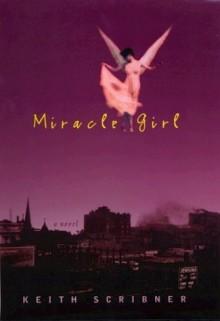Miracle Girl
2003
The San Francisco Chronicle hailed Keith Scribner’s first novel, The GoodLife, as “the literary love child of Truman Capote and Robert Altman.” “An exquisitely choreographed story of the banality of evil,” raved The Baltimore Sun. “Not since John Cheever’s Bullet Park has a novel so captured the violent vicissitudes of suburbia.” Now Scribner turns his eye to the gritty urban landscape of America’s dying industrial cities, to questions about faith and ethics, and tells a twisting tale that will seduce you into suspending your notions about reality until the very last chapter.
Strange, extraordinary things are happening in Hudson City. A beautiful Vietnamese-American girl has been appearing to residents in their dreams, and there are reports that bum legs, sinus headaches, and tonsillitis are clearing up all over town. Amazingly, one young man has even spontaneously regained his hearing. And the Miracle Girl, newspapers and local TV eagerly report, is deaf.
John Fitzgerald Kennedy Quinn manages real estate for the Catholic diocese, but he’s a man of little faith. Raised on Watergate and Vietnam, nurtured on the materialism of the eighties and nineties, he couldn’t be less likely to believe in miracles. Sue Phong, he is certain, is a fraud. But thousands of pilgrims are pouring into upstate New York, eager for healing, hope, or even just a glimpse of the Miracle Girl.
In this sweltering late summer, as the media circus–dubbed “miracle mania”– heats up, Quinn’s world is falling apart. His sex life has disintegrated, and he’s pretty sure that Rita, the love of his life, is having an affair. He feels trapped in his dead-end church job, inching ever closer to forty. And in the middle of it all, his friend Buddy Jensen is trying to sweeten their latest business deal, forcing Quinn to take a hard look at the fine line between a favor and a kickback. He’s primed for a midlife crisis, if not a spiritual one.
And then Quinn finds himself unexpectedly face to face with the enigmatic Sue Phong, and everything begins to change. She teaches him about disillusionment and redemption, and about faith–in himself, in the people he loves, and in the possibility of something greater than all of us. Quinn’s heart and hopes, along with those of his entire community, become inextricably intertwined with one young woman who really might be the Miracle Girl…
Reviews
“Keith Scribner’s talent is alive on every page of Miracle Girl. It’s evident in the snap of dialogue that cuts to the heart of character, and in the memorable characters themselves, instantly drawn, then dramatically stressed into change. It’s evident in the perfect pitch of Scribner’s jittery American prose, and in a pacing that makes this complex, unpredictable story a page-turner.” —Stuart Dybek, author of The Coast of Chicago
“In Miracle Girl Keith Scribner captures the sad romance of New York’s worn upstate river cities, He writes with power about money, religion, and sex. He gives us characters to root for in a story that compels belief.” —Frederick Busch, author of A Memory of War
“The author of The GoodLife (1999) returns with his second: a hardhitting, at times sidesplitting tale of trust, temptation, and redemption. Scribner plants his hero knee-deep in scruples, revealing the gray side of corruption, its agonizing logic and bantering alliances. We experience up-close the weather, temper, and architecture of a city hobbled enough to justify extreme gambits; we root for a couple who cling to their fading relationship, and their fading town, with a stubbornness bordering on piety. A riotously edifying take on civic and private responsibility in an age of elaborate morals.” —Kirkus (starred review)
“Keith Scribner’s fascinating novel…explores how greed can compromise men of (supposed) faith. John Quinn is one such man, [who] reconnects with his faith–not just the kind that religion provides but also a deeper belief in himself, in others, and in the power of love to transform individual lives.” —Washington Post Book World
“A well-crafted story about deceit, money, religion, faith, love and redemption…Scribner’s edgy dialogue and nuanced storytelling make Miracle Girl an exceptional read.” —Albany (NY) Times-Union
“In this follow-up to his successful debut novel, The GoodLife, Scribner focuses on the commercialism of religious fervor. This is a well-crafted story with real characters and an astute insight into the lack of principles in our contemporary culture. Clearly, Scribner is a writer to watch.” —Library Journal
“Scribner’s urban comedy is spirited and often poignant.” —Baltimore Sun
“Miracle Girl is a smart, savvy novel that combines emotional insight with a surprising dose of humor and establishes Scribner as one of the best novelists working in the Northwest.” —Jeff Baker, The Oregonian
“Scribner has created wonderfully human characters with whom he explores the issues of faith, trust, and possibility with exceptional skill and sensitivity. A departure from his debut novel, The GoodLife (1999), this should be just as warmly received.” —Booklist
“Funny, gritty, and tender…this well-crafted second novel demonstrates Scribner’s solid, noirish accessibility and talent for detailed characterizations.” —Publishers Weekly
“Hope and hucksterism lock horns in a dying industrial city when a young woman has visions and the sick suddenly heal, drawing hordes of miracle-seeking ‘pilgrims.’ The movers and shakers in this town that Starbucks forgot–an irascible bishop and a sleazy developer–are, by turns, charming, shameless and hilarious. A quirky, heartfelt second novel with a plot that’s bound to surprise.” —Stanford Review
